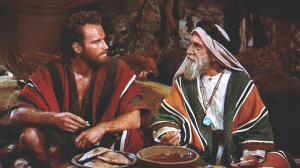Jethro and Moses: Heeding Advice from Those Who are Wiser
1 November 2024

Anyone who has grown up in the church will tell you that as a child they heard the same Bible stories week after week, month after month, and year after year. In fact, many of those stories were told according to a liturgical calendar and we knew right when they were coming up. What child has not thought, “Oh! I have heard that story before. I can teach it.” And there is actually some truth to the child’s statement that he or she could teach that story. Quite frankly, we should allow children to have turns teaching the stories because it is through teaching that we learn the most. (But that is beside the point here – or is it?)
Those children become teenagers who have heard the same stories, and those teenagers become young adults who have heard the same stories and, sadly, often those teenagers and young adults walk away because they “know everything.” They know everything because they think they have heard everything, so what more is there to learn?
Did you ever stop to think that if we would just take more time to engage students in teaching, and thus in learning and in their own spiritual growth, then perhaps not as many would leave over the sake of “knowing everything?” Perhaps if we put the onus of learning on students, as young as we possibly can, rather than feeding them information week after week in a top-down format, they would take responsibility for their own faith. Perhaps, they would dive in more deeply and realize what we have all come to learn as we grow: WE DON’T KNOW EVERYTHING! In fact, no matter how much we study God’s Word, we will NEVER know everything. Studying will bring us in deeper, and while we will receive new light every time we dive in, we will also emerge with more questions which will cause us to continue to return, day after day, week after week, month after month, and year after year.
Let’s take some time to consider Moses. Here was a man who had undergone a serious identity crisis. Born into an Israelite family who had the strength to defy the Egyptians’ demand of death over their son, raised in the palace under the care of the same family who had decreed his death at birth but also under the tutelage of his birth family (talk about conflicting life values!), he killed a guard who he, as a prince in the palace should have supported, for beating his blood relatives. Filled with fear, Moses ran!
Moses ended up in Midian. Exhausted, he sat down by a well to catch his breath. There, he encountered the seven daughters of the local priest Jethro, who had simply come to the well to water their flock of sheep. The local shepherds, for one reason or another, did not like these girls and attempted to drive them away, but Moses, taking pity on them, defended the girls by watering their sheep (Exodus 2:15-17). (Moses clearly had a drive for justice and caring for the least.)
As evidenced by Jethro’s surprise that his daughters had returned so early from their task, the shunning and bullying by other local shepherds must have been a regular occurrence which caused them to take, daily, extra time at the well. Jethro admonished his daughters by asking why they left that man at the well who had helped them and did not invite him to dine with their family. So, the girls went back to invite him over for dinner. Out of gratitude, Jethro gave his daughter, Zipporah, in marriage to Moses (Exodus 2:18-21).
Forty years went by. Moses and Zipporah settled in and had two sons. I can’t imagine that Moses ever forgot his people, but some part of him must have been content to have moved on and started a peaceful new life. Yet, God took this space in Moses’ life to grow him. God took Moses’ crisis and used it to help shape him into the man who would rescue God’s people.
While Moses was living his life and growing his family in Midian, God was continually watching His people who were trapped in Egypt. He was listening to their crying and their groaning, and He decided the time had come to do something about this, so He sent Moses in (Exodus 2:23-25; 3:1-4:31). And Moses went with his father-in-law Jethro’s blessing.
The simple fact that Moses went to his father-in-law to ask his permission demonstrates that Moses had a great respect for this man who had become his earthly father, despite the fact that Jethro did not worship the same God. And Jethro trusted Moses enough that not only did Jethro bless Moses, but he did not stop Moses from bringing his wife and children, Jethro’s flesh and blood, back with him to a strange place where they were sure to be in dangerous circumstances.
At some point, between when Moses brought his family to Egypt and when the Israelites ended up wandering in the desert, Zipporah and her sons, Gershom and Eliezer, returned to Jethro in Midian. Although the timing of this is not mentioned in scripture, it must have occurred because in Exodus 18, Jethro traveled to where Moses was to return Moses’ family to him.
It is in Exodus 18 where we learn what is often thought of as a key skill in leadership. Oddly, however, it is not often taught as a key skill in mentoring, although mentoring has an important role to play in its occurrence, especially viewed in light of the relationship between Jethro and Moses.
In Exodus 18, we read about how about how Jethro, so respected by Moses that one can only imagine how Jethro must have mentored Moses through difficult times and a great deal of growing up, watched the method Moses was using to judge and instruct the thousands of Israelites. Jethro must have seen that Moses was burning out, or was going to burn out, but he also saw how Moses, by taking everything on himself, was robbing those whom Moses was to train and empower. Notice though, that Jethro refrained from immediately dictating what Moses needed to do; instead, Jethro simply asked a Moses reflective question, “What is this you are doing for the people? Why do you alone sit as judge, while all these people stand around you from morning till evening?” (Exodus 18:24, NIV).
Moses’ response, in summation, said, “Well, that is what the people need, and I am the one to do it” (Exodus 18:15-16). Moses’ answer to Jethro’s question oozed of a sympathy to provide what the Israelites needed, but it also oozed of a false perception of reality to which we, as fallen humans, are prone to accept without realizing it. We are not the only ones who are called of God to participate in what God wants done for the furthering of His kingdom; God will do what He is going to do with or without us. We are blessed to be a part of it and we are called to help others to step into their roles as well.
Jethro encouraged Moses to form a downline of God-fearing wise people who could be trained to participate in judging and instructing the Israelites (Moses 18:17-26). In doing this, Moses was able to mentor others to mentor others.
It is true that Moses was a major part of God’s plan, but Moses wasn’t the only one who was part of God’s plan. All those “unknown” people who sit on the sidelines during the story of His Story were equally a part of God’s plan. Scripture does not list all the names of those whom Moses appointed as judges, but their task was necessary, and they were gifted. When we are given a role to play in the kingdom, we must not only recognize that we are replaceable, but that we must work to replace ourselves because not only can we not do it alone, we also will not be around to do it forever. We serve in a community on purpose.
Until Jethro came to see Moses in the wilderness and heard all that Moses had to share about how God saved His people, Jethro was not a believer (Exodus 18:9-12), but Moses respected and learned from him, nonetheless. And, subsequent to Jethro’s conversion, in Numbers 10:29-32, which recounts Jethro’s departure after instructing Moses in Exodus 18, Moses actually asked Jethro to stay on because his presence would be a blessing to all.
Let’s back up a bit here. Moses, who was intensely confused about his identity, killed a man and ran away. When he ran away, he ended up gaining a new family, a new earthly father who was wise and worthy of being a mentor and who guided Moses through an intense and overwhelming crisis. Moses in crisis spent years under the mentorship of Jethro who did not steer Moses away from his own God, but simply helped him through processing pain and forming his, Moses’, identity in the God whom Moses worshipped.
God had gifted Moses with a healing space, a time away, while He, God, prepared him, Moses, to step into his calling. Jethro’s task was to hold open space for Moses to grow with his own God. Jethro’s task, which he did well, was to empower Moses and then release him to do as he, Moses, was called to do.
Each of us, from time to time, need those healing spaces and God gifts them to us, as painful as they are, just as He gifted it to Moses. God provides people to come alongside us, just as God calls us to come alongside others.
Jethro was wise in his years and had formed a mentoring relationship with Moses that God used to help Moses mature into the man who would rescue God’s people. The empowered and released Moses was, in turn, able to empower and release others.
And, to take this even further, as the relationship between Moses and Jethro changed and matured over the years, Moses bore testimony to who God is, which led to Jethro’s conversion and ultimately to the conversion of Jethro’s kin for years to come (Judges 1:16).
Our relationships with our mentees will shift over time. Our relationships with our mentors will shift over time. Never be afraid to heed the advice from someone who is wiser and never be afraid to guide others into new spaces in areas of wisdom which God has gifted you, but never do this with an arrogance that conveys you are the only one who knows and that your way is the only right one. Instead, open spaces for others to learn from the wisdom that God has imparted to them in the way in which He has designed for them to learn and embrace those spaces in which God has given you to learn from the wisdom of others, no matter their age.
